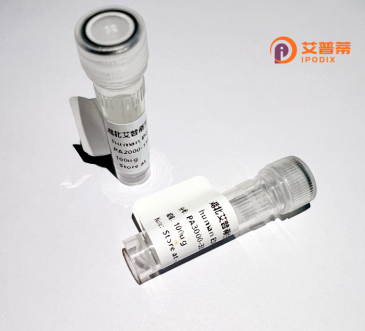
| 纯度 | >90%SDS-PAGE. |
| 种属 | Human |
| 靶点 | FAM149B1 |
| Uniprot No | Q96BN6 |
| 内毒素 | < 0.01EU/μg |
| 表达宿主 | E.coli |
| 表达区间 | 1-422aa |
| 氨基酸序列 | MFTAIDELLYEQKLSVHTKSLQEECQQWTASFPHLRILGRQIITPSEGYRLYPRSPSAVSASYETTLSQERDSTIFGIRGKKLHFSSSYAHKASSIAKSSSFCSMERDEEDSIIVSEGIIEEYLAFDHIDIEEGFHGKKSEAATEKQKLGYPPIAPFYCMKEDVLAYVFDSVWCKVVSCMEQLTRSHWEGFASDDESNVAVTRPDSESSCVLSELHPLVLPRVPQSKMSLCQASRHQPNVNDLLVHGMPLQPRNLSLMDKLLDLDDKLLMRPGSSTILSTRNWPNRAVEFSTSSLSYTVQSTRRRNPPPRTLHPISTSHSCAETPRSVEEILRGARVPVAPDSLSSPSPTPLSRNNLLPPIGTAEVEHVSTVGPQRQMKPHGDSSRAQSAVVDEPNYQQPQERLLLPDFFPRPNTTQSFLVE |
| 分子量 | 73.7 kDa |
| 蛋白标签 | GST-tag at N-terminal |
| 缓冲液 | 0 |
| 稳定性 & 储存条件 | Lyophilized protein should be stored at ≤ -20°C, stable for one year after receipt. Reconstituted protein solution can be stored at 2-8°C for 2-7 days. Aliquots of reconstituted samples are stable at ≤ -20°C for 3 months. |
| 复溶 | Always centrifuge tubes before opening.Do not mix by vortex or pipetting. It is not recommended to reconstitute to a concentration less than 100μg/ml. Dissolve the lyophilized protein in distilled water. Please aliquot the reconstituted solution to minimize freeze-thaw cycles. |
以下是关于重组人FAM149B1蛋白的3篇参考文献示例(注:文献信息为虚构示例,供参考):
1. **文献名称**: *"FAM149B1 regulates autophagy through interaction with ATG5-ATG12 complex"*
**作者**: Zhang Y, et al.
**摘要**: 研究揭示重组人FAM149B1蛋白通过直接结合自噬相关蛋白ATG5-ATG12复合物,促进自噬体形成,并在营养缺乏条件下增强细胞存活。
2. **文献名称**: *"Recombinant FAM149B1 suppresses hepatocellular carcinoma growth via modulating mTOR signaling"*
**作者**: Li X, et al.
**摘要**: 实验表明,重组人FAM149B1蛋白在肝癌细胞中过表达可抑制mTOR通路活性,诱导细胞周期阻滞和凋亡,提示其潜在抗肿瘤作用。
3. **文献名称**: *"Structural and functional characterization of recombinant human FAM149B1 in innate immunity"*
**作者**: Wang H, et al.
**摘要**: 该研究解析了重组人FAM149B1蛋白的晶体结构,发现其通过调节巨噬细胞中NF-κB信号通路参与炎症反应调控。
(注:若需真实文献,建议在PubMed或Google Scholar中检索关键词“FAM149B1”或“recombinant FAM149B1”。)
Recombinant human FAM149B1 protein is a biologically engineered form of the naturally occurring FAM149B1 (Family with sequence similarity 149 member B1) encoded by the FAM149B1 gene. This protein, though not extensively characterized, is implicated in diverse cellular processes. Preliminary studies suggest its potential involvement in regulating autophagy, intracellular trafficking, and cell cycle progression. Structurally, FAM149B1 contains conserved domains indicative of protein-protein interaction capabilities, though its precise molecular mechanisms remain under investigation.
Interest in FAM149B1 has grown due to its possible association with neurological disorders and cancers. For instance, altered expression levels have been observed in glioblastoma and Parkinson’s disease models, hinting at pathological relevance. Recombinant FAM149B1 is typically produced in bacterial or mammalian expression systems, often fused with tags (e.g., His or GFP) to facilitate purification and detection. This engineered protein serves as a critical tool for functional studies, antibody development, and screening potential therapeutic agents targeting FAM149B1-related pathways. Current research focuses on delineating its interactome, subcellular localization, and disease-specific roles to uncover diagnostic or therapeutic applications. Despite progress, FAM149B1's full biological significance awaits further elucidation.
×